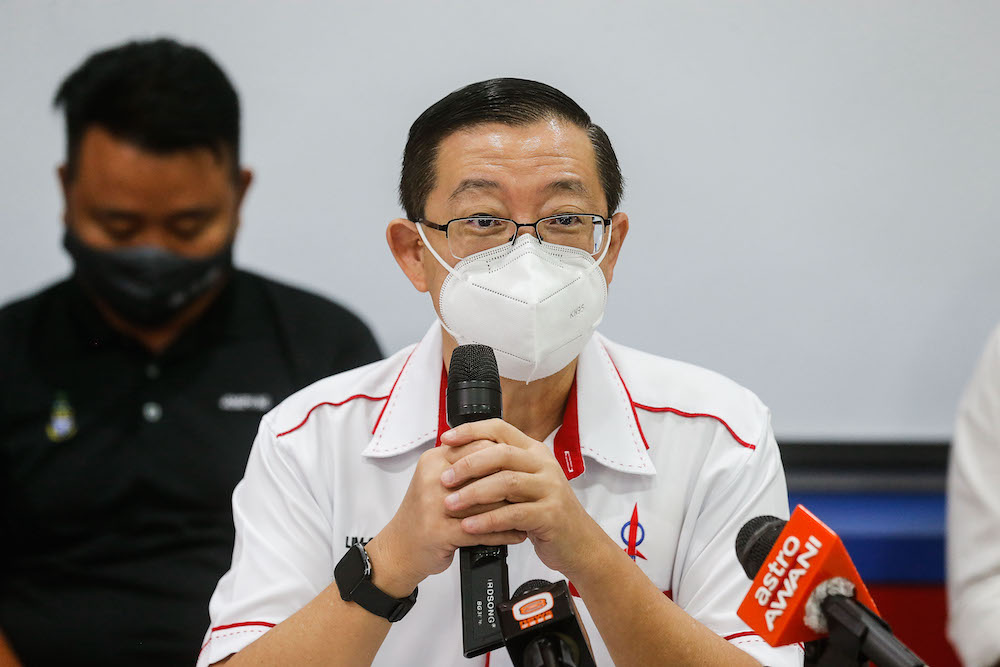KUALA LUMPUR, July 25 — The DAP released a policy position paper today proposing its strategies for Malaysians to live with Covid-19 even as it urged the government to move away from containment measures and prevent further devastation of lives and livelihood.
The paper, titled “Gearing Malaysia Towards Living With Covid-19”, suggested key strategies that would seek to control and mitigate the current wave of infections, prepare for future outbreaks, and open up social and economic sectors with safety catches.
Former finance minister and DAP secretary-general Lim Guan Eng said there was a need for a paradigm shift after cases continue to soar despite the government having enforced strict restrictions.
“The ‘new normal’ is not about living with perpetual lockdowns in their various forms,” the Bagan MP said in a virtual press conference this afternoon.
“The ‘new normal’ is how Malaysia can adopt measures to minimise and mitigate the presence and impact of Covid-19 within our community while reopening most, if not all of our social and economic activities,” he added.
Most of the strategies outlined in the paper are propositions backed by independent public health experts that have been made in the past but mostly ignored by the government.
To rein in the current rate of infections, the paper emphasised on a national testing strategy to “find, test, trace, isolate, support plus vaccination”, or FTTIS+ in short.
The party called for systematic testing and widening the government’s contract tracing capacity by outsourcing it to the private sector. The paper also suggested the government subsidise the testing, including for self-testing at home.
Lim said the cost could be around half a billion ringgit, a sum the government could afford.
“We are losing up to RM500 billion from the MCO… I think we could have prevented this by investing in testing,” he told the zoom press conference.
The lockdowns have had a devastating effect on the economy, with estimated losses of at least RM500 billion since the first movement control order was enforced in March last year.
The Perikatan Nasional administration has enforced several MCOs since then, causing the economy to contract by 5.6 per cent last year.
Lim’s successor to the Finance Ministry Datuk Seri Tengku Zafrul Abdul Aziz said recently that the government would have to revise its GDP growth projections from as high as 7.5 to 4 per cent.
Despite unveiling several stimulus packages totalling RM80 billion in direct fiscal injection, most small and micro businesses said help has been inadequate, prompting industry representatives to call for an immediate lifting of movement curbs.
The DAP echoed the call. In its policy paper, it proposed a “smarter” reopening by allowing certain sectors to reopen under strict standard operating procedures and conditions, including for those located in states still under Phase 1 restrictions.
Among sectors it felt were ready to reopen are the sports and tourism sectors, which can be done by enforcing strict bubbles starting with the domestic market and expanding to international travellers who have been fully vaccinated.
The paper had also suggested allowing international travel to low-risk countries, like Singapore.
To do this, the paper proposed the government move away from using daily numbers of Covid-19 positive cases as the threshold to progress into phases where more restrictions will be lifted, and employ targeted indicators such as the public healthcare system capacity.
Bangi MP Ong Kian Ming, one of the chief strategists behind the paper, said the focus should be on Category 3, 4 and 5 Covid-19 cases instead, since they require hospitalisation and intensive care.
Category 1 and 2 cases, affixed for people with asymptomatic and with mild symptoms, account for a majority of the country’s high daily positive cases, but often do not require treatment at hospital and can be quarantined at home.
The adjusted indicator would then allow for more businesses to reopen safely and prevent blanket lockdowns, Ong suggested.
In the last few weeks, more public health experts have shifted their focus away from containment and moved towards strategies that would ease the strain on public hospitals, with the view that Covid-19 could become endemic.
Opposition lawmakers have also drawn attention to the dire state of businesses affected by the current lockdown, which has lasted over two months.
The DAP in its policy paper suggested it’s possible to lift restrictions on businesses through improved data use, such as using MySejahtera data to identify potential hotspots in the future and smarter SOPs at workplaces tailored according to the type of workplace and accommodation quarters.
“These recommendations also serve as essential building blocks to pave the way ahead for longer term structural reforms that Malaysia urgently needs,” Lim said.
“In addition to addressing the nation’s immediate health and economic concerns by presenting a concrete exit strategy from the disruptive continuous lockdowns.”



















